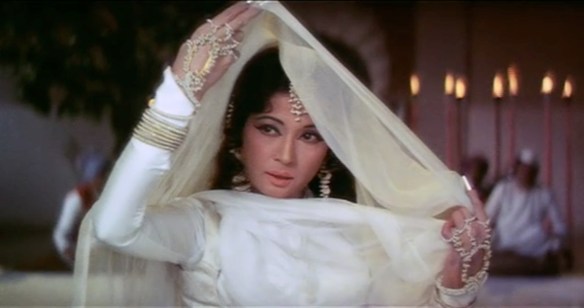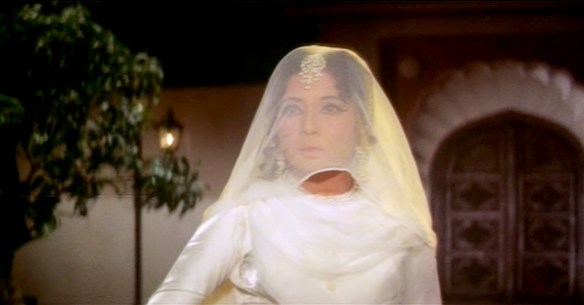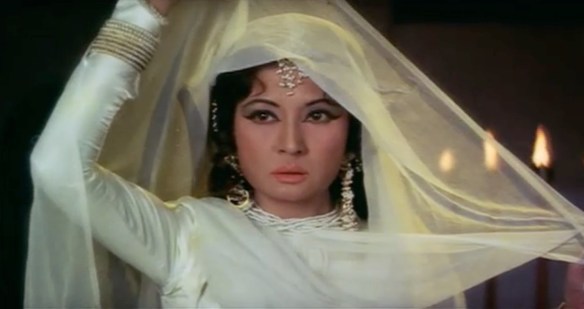
Bedecked in a white gown symbolic of her own death, Pakeezah dances at the celebration of her lover’s marriage to another woman in Pakeezah (1971).
We now showcase the lyrics and English translation to Lata Mangeshkar’s “Teer-e Nazar” from the cinematic jewel Pakeezah (1971). One of classic Bollywood’s most iconic and daring song sequences, “Teer-e Nazar” dazzles the audience by the audacity of its stunning visual fabric–the magnum opus of the industry’s greatest artists with a story worthy of their union. In an ironic twist, the film’s heroine Pakeezah is asked to perform a mujraa at the wedding of her lover to another woman. Throughout the striking song that follows, director Kamal Amrohi deliberately transforms our understanding of beauty and love into omens of murder and death.
Lyricist Kaif Bhopali’s title phrase “teer-e nazar,” while otherwise a romantic reference to a lover’s piercing gaze, assumes a sinister implication, a literal means of wounding its target. Pakeezah once more dances a graceful kathak dance, but this time she is dressed for a funeral in all-white. The death she celebrates is her own. Her beautiful dance suddenly re-invents itself when she purposefully smashes a glass chandelier across the pristine white floor. The moment is one of the most shocking in Bollywood history, with a dramatic shift in the room’s dynamics to accompany the jarring musical screech. Before this moment, Pakeezah was a mere witness to the injustice of her society’s prejudices. Now, Pakeezah wields a commanding power, entrancing a captive audience to which she willingly presents herself as a ritual sacrifice in the name of her own unfulfilled love.

Like a veiled Lady of Shallot, the effervescent Meena Kumari as Pakeezah realizes the show is coming to an end tonight.
Unleashing a passion she had been trained for so long to suppress, Pakeezah dances upon the jagged broken glass with a frenzied energy. Her blood, the bright red of wedding bliss she has been denied, stains the floor with every footstep. As evidenced by the film’s famous dialogue, feet play an important sensual role in Pakeezah. The blood-smeared feet ironically mirror the once dainty red foot paint of a dancer–the vehicle by which Rajkumar first fell in love with Pakeezah in a train compartment, begging her romantically to never allow them to touch the ground. With each step, Pakeezah regains her identity by destroying the constraints of her past.
Director Kamal Amrohi brilliantly shapes the scene through a chaotic editing pattern as fragmented and disturbing as the glass upon which she dances. Below is a short gallery of some of the many gorgeous shots that compose this scene, each more violent than the next.
This iconic song is among Bollywood’s greatest cinematic moments–made even more fascinating by the behind-the-scenes gossip between Meena Kumari and stunt double Padma Khanna who actually dances in this sequence! Follow along with the video, and we hope you enjoy our lyrics and English translation to the awe-inducing “Teer-e Nazar” from Pakeezah (1971) below!
Teer-e Nazar Dekhenge Lyrics and Translation:
Aaj hum apnii du’aao.n kaa asar dekhe.Nge
Today I shall behold the image of my prayers
Teer-e nazar dekhe.Nge, zakhm-e jigar dekhe.Nge
I shall see arrows from your glances, I shall see the wounds of my heart
Aap to aa.Nkh milaate hue sharmaate hai.N
Upon meeting my eyes, you feel embarrassed
Aap to dil ke dhaDakne se bhi Dar jaate hai.N
You are even afraid of your own heartbeat
Phir bhi yeh zidd hai ki ham zakhm-e jigar dekhe.Nge
Nonetheless I remain stubborn to witness the wounds of my heart
Teer-e nazar dekhe.Nge, zakhm-e jigar dekhe.Nge
I shall see arrows from your glances, I shall see the wounds of my heart
Pyaar karna dil-e betaab buraa hotaa hai
It is unfortunate for a weak heart to fall in love
Sunte aaye hai ki yeh khwaab buraa hota hai
I have heard that this dream of mine is also cursed
Aaj is khwaab ke taabiir magar dekhe.Nge
But today I will interpret the meaning of that dream
Teer-e nazar dekhe.Nge, zakhm-e jigar dekhe.Nge
I shall see arrows from your glances, I shall see the wounds of my heart
Jaan levaa hai mohabbat ka samaa aaj ki raat
Tonight this atmosphere of love feels fatal
Shamaa ho jaayegii jal jal ke dhuaa.N aaj ki raat
Tonight the lamps shall burn into smoke
Aaj ki raat bache.Nge to sahar dekhe.Nge
If I escape tonight, then I shall see the dawn
Teer-e nazar dekhe.Nge, zakhm-e jigar dekhe.Nge
I shall see arrows from your glances, I shall see the wounds of my heart
Aaj hum apnii du’aao.n kaa asar dekhe.Nge
Today I shall behold the image of my prayers
Teer-e nazar dekhe.Nge, zakhm-e jigar dekhe.Nge
I shall see arrows from your glances, I shall see the wounds of my heart
Glossary:
du’aa: prayer; asar: sign, image; teer: arrow; nazar: glance; zakhm: wound; jigar: heart; aankh milaanaa: to make eye contact; sharmaanaa: to become embarrassed, to be shy; dhaDaknaa: to beat [heart]; Dar jaanaa: to become afraid; zidd: stubborness, firm; betaab: weak; buraa: bad, unfortunate; khwaab ke taabir: interpretation of a dream; jaan levaa: fatal; mohabbat: love; samaa: atmosphere; shamaa: lamp; dhuaa.N: smoke; sahar: dawn
This fantastic Pakeezah hit was requested by fans VintageBollywood and Moosa Desai! Thank you for the epic request!
Arguably, Pakeezah’s wild dance following the chandelier shattering contains the most thrilling music (composed by the great Ghulam Mohammed) in the entire film. But there’s a big unsolved mystery here. Does the ambiguity of the diegetic soundscape in this sequence bother anyone else but me? Think about it: If Pakeezah had just smashed a chandelier to the ground, ruffling the entire audience, and then starts bleeding all over the party floor, is it likely that the band would carry on as usual? But on the other hand, if the music is, in fact, non-diegetic, what are the odds her dance movements are still so perfectly coordinated to the beat? Is she in theory really dancing like a maniac to a silent room while the furious strings Kamal Amrohi added are for the film viewers’ ears alone? This is going to keep me awake at night.
For lighter moments from the iconic film, check out our translations of Pakeezah‘s immortal Chalte Chalte, Mausam Hai Aashiqaana, and Inhi Logo.N Ne!
-Mrs. 55









Thank you thank you… you guys are the best in the world for liking the black and white era…. i am joyous to know that somebody understands my taste. One day i will pen my thoughts on what i feel when i see these songs on TV.
We are always happy to find another lover of classic films! Thank you for reading!
My favorite song from the film, love, love, love it. So perfect in every way.
Thanks for the gossip, it may be a first for Meena to be called a hot mess, but who knows how that is interpreted today. You guys are great!
Hahaha, it may indeed be a first to call Meena Kumari a hot mess, but that doesn’t make it any less true! But it works so well in this song–making it, as you say, so perfect in every way!
Pingback: Making the Cut in Pakeezah | Mr. & Mrs. 55 - Classic Bollywood Revisited!
Va! Thank you for sharing. As a courtesan, this is my favorite part of the film. I also wanted to write my own review of this song, because it truly expresses the self-destructive behavior that results from tragic love. My heart literally drops when watching Sahib Jaan’s face turn from optimism to hopelessness when she finds that Salim (her love) has suddenly disappeared. His absence confirms that hope is lost, so Sahib jan seeks to destroy any dignity, any pride that is left (a true martyr of love).
I am still amazed at how well Kamal Amrohi truly conveyed the emotions of a courtesan, as so many others have attempted only to portray mere fragments.
Sahar jan
Thank very much, Mrs 55! Terrific song and what a scene. I had such mixed emotions after watching the scene of this song. Appalled, amazed, aghast and anxious. It was a relief to see the happy ending. I had a couple of comment/questions:
“Aaj hum apnii du’aao.n kaa asar dekhe.Nge” You’ve translated asar as ‘image’. I would have probably said ‘effect’. At least I’ve always used ‘asar’ to mean ‘effect’ in hindi.
What do you think happens to the bride that RaajKumar was set to marry in that last scene. Do you think he marries both of them? Or just Meena Kumari? Wondered if you had any insight into that.
Thanks again for a wonderful website. I’d love it if you posted your ‘must-see’ list of Bollywood classics. I loved Pakeezah and now I’m making my way through the Guru Dutt’s amazing movies.
That’s an excellent point! The term “asar” has multiple interpretations–and “effect” is certainly one of them. The translation of that word colours the phrase slightly differently–I leave it to you to decide which sets the tone better! 🙂
I always imagined he marries only Meena Kumari in the end, but that could just be my girlish optimism. In some traditions, a bride is said to be “cursed” if she does not marry with the alotted time frame as planned, so he may have possibly married her out of honor as well. I sure hope not though! That’s a very interesting question!
Stay tuned for our list of “must-see” Bollywood films! We’ve been working on releasing a post on it for some time!
I would think that since his family was “defamed” because of Sahibjaan being a courtesan, the bride’s family would have called off the wedding.
I agree, the close-ups of her face are really stirring–you can completely feel her emotions in the scene and all their nuances. We would love to hear your review of the song one day! Thank you for sharing your insight!
The fact that the band continues to play, while Sahibjaan dances on the shards of broken glass, I guess, can be ascribed to poetic license…and it does work pretty well. I don’t think Sahibjaan is dancing to a silent room, because you can see the musicians physically playing their instruments for the duration of the song.
When she sings ‘Teer-e-Nazar dekhenge, zakhme jigar dekhenge’/ , the arrow like glance or piercing gaze is her own, rather then his. Her eyes are accusing and reproaching him, while he can barely meet her gaze because of the letter he has written to her, and the circumstances in which she is present in the gathering. The ‘zakhme jigar’ or wounded heart applies to both of them; they’re both hurting, as do the lines ‘Jaanleva hai mohabbat ka samaa aaj ki raat…Aaj ki raat bachenge to sahar dekhenge’. This night is taking it’s toll on both of them; It’s a night of intense pain and intense love.
I’m quite sure that he doesn’t marry both of them. It seems very counter-intuitive, and when she reads the letter conveyed to her, via a messenger, she is grieved on three counts. The fact that he addresses her as ‘Sahibjaan’, his announcement of his marriage to another woman, and his request that she perform a mujra on this occasion. If he was also to marry this other girl, then it would be a seriously compromised ‘happy ending’ for Sahibjaan, and would undercut the high romanticism of the film.
@silverambrosia, I could not have said it better. The integrity of the film’s sense of morality would be compromised if Sahibjaan and Salim did not at last marry and the circle that was broken by her father’s family in rejecting her mother would remain incomplete. And that’s an excellent reading of the line “teer-e nazar” in which both parties are suffering. Great thoughts as always!
Pakeezah was not the protagonist name in film. The word means ‘pure/unadulterated’. It is symbolism in the movie.
After Salim takes Sahib Jaan away a little more than half way into the film, he actually does rename her Pakeezah! The irony of the name does not escape her and she continues to be tormented.
This is a very powerful song and I think one that is still relevant today. I can imagine a self-harmer going through the same thoughts as the Pakeezah character here. With the same sort of violent strings playing as they harm, like you say it would keep me up at night as well.
Also for asar, i tend to agree with the previous reply, I would read it as affect (effect) rather than sign.
Her self-harming behavior in this sequence actually reminds me of a type B personality disorder–but her prior actions (maybe slightly on the histrionic side), make me think this was a spur of the moment decision stemming more from the depressing situation than from a wish to attract more attention! Nonetheless, the scene has captivated audiences for decades and have certainly kept me up at night haha!
Being a big fan of meena kumariji I cannot help but end up crying whenever this song plays in the movie…it is about a woman who despite so much pain and suffering keeps on going much like what she had dealt in her real life…..the whip like music a the starting cannot help but move one to tears…. ❤❤
I like how the torches were placed – it looks like she’s committing sati. I love the symbolism in this song, not the actual practice, btw.
Great post – I’ve got the Pakeezah songs on repeat so I appreciate the excellent commentary!
Hi
Great site. i’ve read every article of yours on Pakeezah as I’m as much fascinated as anyone else about this movie and its story. I feel the distributors of the video do a great injustice to this magnum-pus of a movie by NOT including english subtitles as the majestic language cannot be understood by all. Had I not come about your site I would never have known the meanings of those enchanting sentimental-melancholic tunes. I tried watching the film on Youtube and I gave up right at the start when Meena Kumari was being whisked away on the horse-drawn carriage to the cemetary with the voice over. Could not understand a thing.
Given there are even quite some old b&w movies of the 1950’s & 60’s even with subtitles e.g Madhumati, Paigham etc. I think it’s a shame you don’t get it with Pakeezah or Mughal-e Azam. Please let me have your thoughts.
Kind regards
Hassam
Love this movie. As a student of Hindustani classical music, I’ve always been fascinated by the tawaif figure. Lataji’s voice and Meena Kumari’s acting are just amazing in this film.
You said so well that “Pyar Kiya To Darna Kya” could reflect LGBT concerns. I agree. But I’ve always thought that “Teer-E-Nazar Dekhenge” was also, in a sense, somewhat of an LGBT song for the way it so ably chronicles the darker side of love, love as a thing that can be deadly or dangerous to lovers. I can deeply empathize with the whole idea of forbidden love and even with Sahibjaan’s helpless anger at her own heartbreak and pain, her anger and self-loathing. I have certainly never been in this exact, very melodramatic situation. I have never tipped a glass lamp over while singing at my lover’s wedding and danced on broken glass shards to prove a point. LOL. But I have felt the hurt of being ignored and rejected in love, and so I feel almost proud of the character in this scene- she’s been ignored so long and her bloodstained dance is like a silent scream, daring them all to challenge her. LGBT people know all about zakhm-e-jigar and having to choose between love vs. society. P.S. I cannot seem to find Pakeezah anywhere with English subtitles on streaming in the U.S. I might just actually have to spring for a physical copy of a DVD! I’d show it to my students, if the head of my department is comfortable with me showing college students a movie about tawaif…